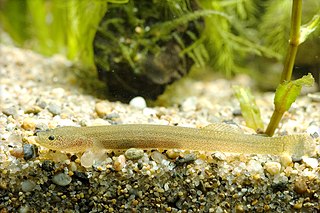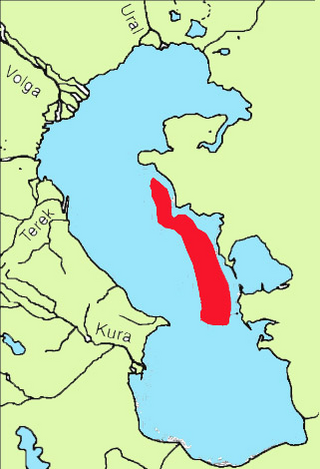
Stiphodon is a genus of freshwater gobies. They inhabit swift, clear streams close to the sea and are found in large parts of Asia and Oceania. Many of the 36 currently recognized species have extremely restricted distributions on single islands or even single streams. These are small gobies with bodies squarish in cross section. A female of Stiphodon multisquamus with a standard length of 60.4mm is the largest Stiphodon individual on record. Males of Stiphodon species are often vividly colored and a few species are occasionally sold in the aquarium trade, including Stiphodon ornatus, Stiphodon atropurpureus, Stiphodon maculidorsalis, Stiphodon semoni, and Stiphodon surrufus.

Akysis is the largest genus of catfishes of the family Akysidae.

Schismatogobius is a genus of fish in the subfamily Gobionellinae. They are native to southern and eastern Asia, Australia and the Pacific Islands. Adults dwell in freshwater habitat such as streams and rivers, where they live along the sand and gravel substrates.

Rhinogobius is a genus of primarily freshwater gobies in the family Oxudercidae, native to tropical and temperate parts of eastern Asia. Most are small, streamlined in shape, and often sexually dimorphic. Few are of commercial importance, but R. duospilus is fairly widely traded as an aquarium fish.
Lentipes is a genus of gobies in the family Oxudercidae, native to fresh, marine and brackish waters of the Malay Archipelago and islands in the Pacific. Its species are typically from fast-flowing streams and some are anadromous.

Luciogobius is a genus of goby in the subfamily of Gobionellinae, commonly called worm gobies. It is distributed along the coast of northeastern Asia, where species can be found in Korea, China, Taiwan, and Japan. Most species occur in Japan, and several are endemic.

Mugilogobius is a genus of fish in the family Gobiidae. They are found in fresh, brackish and marine water of the Indo-Pacific region. Several of the freshwater species have highly restricted distributions.
Stiphodon surrufus is a species of goby endemic to the Philippines where it is only known to occur in Lagu Lagu creek on Leyte Island. It inhabits areas with boulders and swift-flowing water. This species can reach a length of 2.1 centimetres (0.83 in) SL.

The tadpole-gobies (Benthophilus), also called pugolovkas, are a genus of Ponto-Caspian fish in the family Gobiidae.

The stellate tadpole-goby is a species of gobiid fish native to the basin of the Sea of Azov where it occurs in the Gulf of Taganrog and limans of the eastern coast. It also lives in the lower Don River up to the Tsimlyansk Reservoir. It occurs in fresh and brackish waters of depths greater than 3 metres (9.8 ft), preferring shallow coastal lagoons and lowland rivers. Males can reach a length of 13.5 centimetres (5.3 in) TL while females only reach 11 centimetres (4.3 in) TL.

The Don tadpole-goby is a species of goby widespread in the basin of the Sea of Azov, specifically in the lower Don River and Tsimlyansk Reservoir. This species is found in rivers, reservoirs and river mouths, but is not known to enter seas. It is introduced and invasive upstream the Volga River, e.g. the Kuibyshev Reservoir. This fish can reach a length of 6.6 centimetres (2.6 in) SL. Life span is about one year.

The Azov tadpole goby is a species of goby native to the basin of the Sea of Azov, specifically in the near-estuary zone of the Kuban River, to west until Ukrainian part of the Taganrog Bay and the Strait of Kerch, in the Mius estuary, Yeya estuary, and Akhtanizovskii Liman. This species is only found on silty estuarine bottoms. It can reach a length of 8.4 centimetres (3.3 in) TL.

The Caspian tadpole goby is a species of goby which is widespread in the basin of the Caspian Sea, specifically in the near-estuary zone of the rivers and in small bays. It is a common species in the Volga River delta near Astrakhan, occurred in the deltas of rivers Terek, Ural, Samur. During the warmer months, this species prefers to live at depths of from .5 to 10 metres, moving in the colder months to depths of 20 to 25 metres. It can reach a length of 11.6 centimetres (4.6 in) TL.

The small-spine tadpole-goby is a species of goby, a small fish native to the eastern coasts of the Caspian Sea and the lower reaches of the Volga River up to Volgograd. In the sea it is recorded from the Cape Peschany to the Çeleken Peninsula and Ogurja Ada Island in the south. It is abundant the Volga River delta. This species can be found at depths down to 50 metres (160 ft) although the adults generally are not found deeper than 11 metres (36 ft). This species can reach a length of 6.6 centimetres (2.6 in) TL. The specific name honours the Azerbaijani ichthyologist A. A. Mahmudbekov, studied the fish of the Caspian Sea for much of his life.

The Caspian stellate tadpole-goby, also known as the starry goby, is a species of gobiid fish endemic to the Caspian Sea basin. It is widespread along all coasts of the Caspian Sea with exception of the central-eastern, and in the lowest part of the Volga River. In the southern part of the basin, it is mentioned near the Ogurja Ada, in the Gorgansky Bay, and in the Sefīd-Rūd River. This species can reach a length of 10 centimetres (3.9 in) SL.

Benthophilus svetovidovi is a species of goby native to the eastern coasts of the Caspian Sea: near the capes Sagandyk, Melovyi, Peschany, Karasyngyr, off Türkmenbaşy, probably near Ogurja Ada.

Benthophilus casachicus is a species of goby widespread along the eastern coasts of the Caspian Sea from the Cape Pischanyi to Ogurja Ada at south, also near Astrakhan. This species prefers estuaries and coastal waters. This species can reach a length of 7.6 centimetres (3.0 in) TL.

The Gobionellinae are a subfamily of fish which was formerly classified in the family Gobiidae, the gobies, but the 5th Edition of Fishes of the World classifies the subfamily as part of the family Oxudercidae. Members of Gobionellinae mostly inhabit estuarine and freshwater habitats; the main exception is the genus Gnatholepis, which live with corals in marine environments. The subfamily is distributed in tropical and temperate regions around the world with the exception of the northeastern Atlantic Ocean, the Mediterranean Sea, and the Ponto-Caspian region. It includes around 370 species and 55 genera: Wikipedia articles about genera list about 389 species.
Papuligobius uniporus is a species of small goby in the subfamily Gobionellinae. It is also the type species of the genus Papuligobius.
Stiphodon weberi is a species of goby known only from known from Ambon and Halmahera, Maluku and Yapen Island, Irian Jaya, Indonesia. This species can reach a length of 4.3 centimetres (1.7 in) SL.















